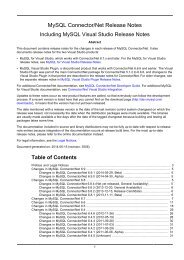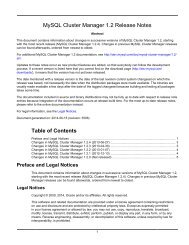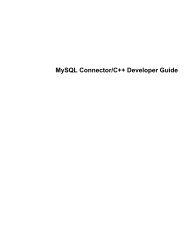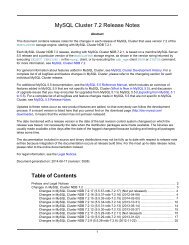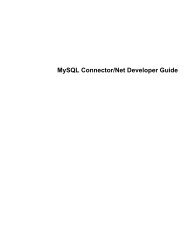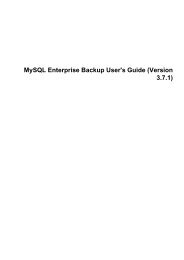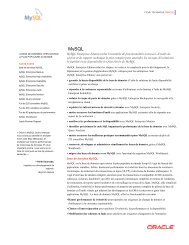MySQL 5.7 Release Notes - Download - MySQL
MySQL 5.7 Release Notes - Download - MySQL
MySQL 5.7 Release Notes - Download - MySQL
You also want an ePaper? Increase the reach of your titles
YUMPU automatically turns print PDFs into web optimized ePapers that Google loves.
<strong>MySQL</strong> <strong>5.7</strong> <strong>Release</strong> <strong>Notes</strong>• InnoDB; Replication: Attempting to reset a replication slave while innodb_force_recoveryis greater than 0 would return a cryptic error message: ERROR(1030) HY000: Got error -1from storage engine. The error message has been changed to: ERROR HY000: Operationnot allowed when innodb_force_recovery > 0. Replication options such as --relaylog-info-repository=TABLEand --master-info-repository=TABLE store informationin tables in InnoDB. When innodb_force_recovery is greater than 0, replication tables cannotbe updated which may cause replication administration commands to fail. (Bug #17287443, Bug#69907)• InnoDB; Replication: An INSERT ...ON DUPLICATE KEY UPDATE statement run on a table withmultiple unique indexes would sometimes cause events to be incorrectly written to the binary log.(Bug #11758237, Bug #50413)• InnoDB; Replication: Using the InnoDB memcached plugin (see InnoDB Integration withmemcached) with innodb_api_enable_binlog set to 1 caused the server to leak memory. (Bug#70757, Bug #17675622)• InnoDB: trx_undo_truncate_start would write to the redo log for temporary undo logsegments, resulting in a purge thread assertion. (Bug #18252937)• InnoDB: A !sync_check_iterate(check) assertion occurred in fts_create_doc_id()during an INSERT operation. (Bug #18253210)• InnoDB: The GCC 4.4 Compiler would emit a bogus warnings about InnoDB parsing functions,indicating that output is uninitialized. (Bug #18192536)• InnoDB: log_mutex_exit should be called before log_buffer_extend when the log buffermutex is held. (Bug #18202904)• InnoDB: InnoDB would write to the redo log for some operations on temporary tablespaces. (Bug#18226934)• InnoDB: Doublewrite buffer error messages referenced page numbers in an inconsistent manner.(Bug #18242594)• InnoDB: The truncate_t::drop_indexes and truncate_t::create_indexes methodswould disable redo logging when modifying the system tablespace. (Bug #18236000)• InnoDB: Unused parameters and variables along with disabled functionality has been removed fromredo log code. This patch also includes redo log code improvements including test enablement,addition of Valgrind instrumentation, and minor code refactoring. (Bug #18251675)• InnoDB: An invalid memmove in fts_query_fetch_document would cause a serious error. (Bug#18229433)• InnoDB: For full-text queries, a failure to check that num_token is less thanmax_proximity_item could result in an assertion. (Bug #18233051)• InnoDB: InnoDB would perform unnecessary redo log writes and flushing for temporarytablespaces. (Bug #18236692)• InnoDB: The user defined type, xid_t, was defined multiple times. (Bug #18251254)• InnoDB: To simplify code and reduce memory usage, InnoDB redo log scan records for file-leveloperations, previously stored in a hash table, are now processed immediately. (Bug #18180875)• InnoDB: The loader in some Solaris versions would refuse to start a GCC-compiled binary (such asthe mysqld binary) that uses the PAUSE assembler instruction. (Bug #18122171)• InnoDB: Temporary tablespace file size did not match the file size specified by --innodb-tempdata-file-pathdue to an error in file size allocation logic. (Bug #18141070)23



